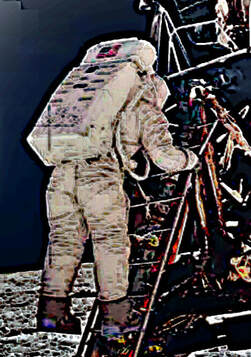
This summer has seen much well-deserved reminiscence of the first Moon landing. I was fifteen and just out of what we called junior high school, now more commonly referred to as middle school, when I watched the landing streamed live on TV. Just the previous summer I had gone with my family to the “fancy” Houston theater to see 2001: A Space Odyssey, and of course I had seen every episode of Star Trek. Space travel was a fixture of my imagination. I don’t know that it was the first book I read, but the first book I remember reading was Robert Heinlein’s Have Space Suit Will Travel. So seeing someone actually set foot on the Moon was exciting.
And a bit disappointing. Of course, there was no way Neil Armstrong’s first step could be as thrilling as Keir Dulyea traversing a wormhole to the other side of the Galaxy, nor could it compete with the fantastic adventures of all that pulp science fiction I consumed. Mostly, though, I was disappointed with the “one small step” pronouncement. It sounded to me like something written by a committee.
So I was young and stupid at the time, but I’d been hoping for something like “Tomorrow the Stars!” I now realize, of course, that Armstrong faced not only a historic first step but the ridiculous position of being live-streamed to millions of viewers back home. That was as unprecedented as landing on the Moon itself. Stanley didn’t have a camera crew accompanying him when he found Livingston. Sir Edmund Hillary and Tenzing Norgay had no such added pressure when summiting Mt. Everest. Hillary claims they just shook hands and hugged in silence. Somewhat better known is his statement to George Lowe as he and Norgay were descending: “Well, George, we’ve knocked the bastard off.” Hillary himself was unimpressed with Armstrong’s words; “Better if he had said something natural like ‘Jesus, here we are.’”
But imagine the consternation had Armstrong made an off the cuff wisecrack. He’d have never been able to escape it. Who is to say Stanley didn’t really remark, “Livingston, you sod, where the f--- have you been hiding yourself?” He had plenty of opportunity to spin the story a bit before making it back to give all those speeches to the explorer societies. But Armstrong was going to be stuck with whatever he said. Any wonder, then, that he came up with prepared—and prepared sounding—remarks?
And he was correct; it was a giant leap. So giant, in fact, it hasn’t been repeated since the last Apollo mission departed the Lunar surface almost forty-seven years ago. That is the greatest disappointment, of course. So many of my generation grew up believing—well, fantasizing, actually—that colonization of the solar system was just around the corner. The “space race” was supposed to give way to human cooperation exploring Mars, the asteroids, and the moons of Jupiter and Venus. Turns out that was too difficult and way too expensive, so we went back to bickering among ourselves.
Still, it’s nice to remember the dream. And maybe it’s just a dream deferred.
David
And a bit disappointing. Of course, there was no way Neil Armstrong’s first step could be as thrilling as Keir Dulyea traversing a wormhole to the other side of the Galaxy, nor could it compete with the fantastic adventures of all that pulp science fiction I consumed. Mostly, though, I was disappointed with the “one small step” pronouncement. It sounded to me like something written by a committee.
So I was young and stupid at the time, but I’d been hoping for something like “Tomorrow the Stars!” I now realize, of course, that Armstrong faced not only a historic first step but the ridiculous position of being live-streamed to millions of viewers back home. That was as unprecedented as landing on the Moon itself. Stanley didn’t have a camera crew accompanying him when he found Livingston. Sir Edmund Hillary and Tenzing Norgay had no such added pressure when summiting Mt. Everest. Hillary claims they just shook hands and hugged in silence. Somewhat better known is his statement to George Lowe as he and Norgay were descending: “Well, George, we’ve knocked the bastard off.” Hillary himself was unimpressed with Armstrong’s words; “Better if he had said something natural like ‘Jesus, here we are.’”
But imagine the consternation had Armstrong made an off the cuff wisecrack. He’d have never been able to escape it. Who is to say Stanley didn’t really remark, “Livingston, you sod, where the f--- have you been hiding yourself?” He had plenty of opportunity to spin the story a bit before making it back to give all those speeches to the explorer societies. But Armstrong was going to be stuck with whatever he said. Any wonder, then, that he came up with prepared—and prepared sounding—remarks?
And he was correct; it was a giant leap. So giant, in fact, it hasn’t been repeated since the last Apollo mission departed the Lunar surface almost forty-seven years ago. That is the greatest disappointment, of course. So many of my generation grew up believing—well, fantasizing, actually—that colonization of the solar system was just around the corner. The “space race” was supposed to give way to human cooperation exploring Mars, the asteroids, and the moons of Jupiter and Venus. Turns out that was too difficult and way too expensive, so we went back to bickering among ourselves.
Still, it’s nice to remember the dream. And maybe it’s just a dream deferred.
David


 RSS Feed
RSS Feed